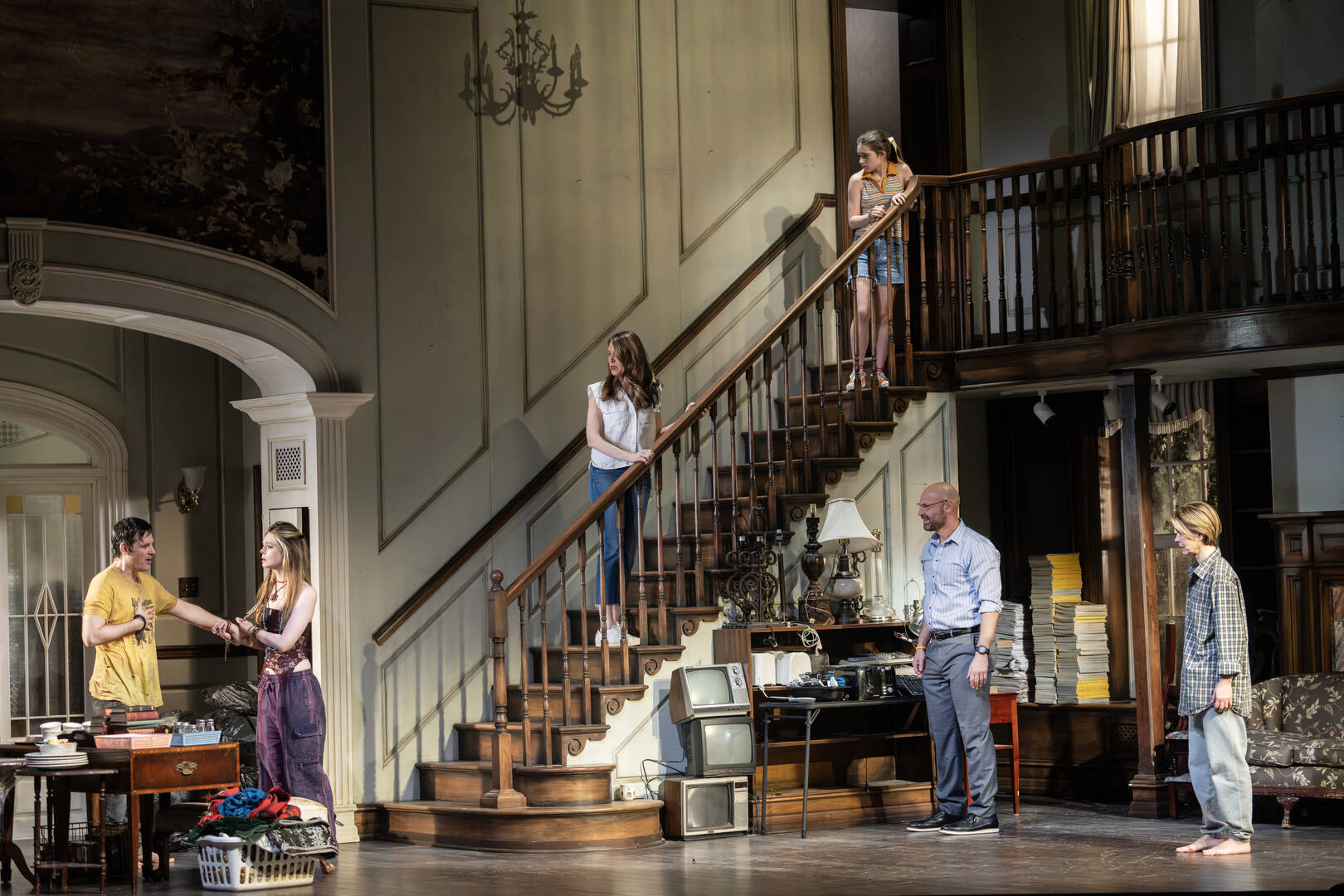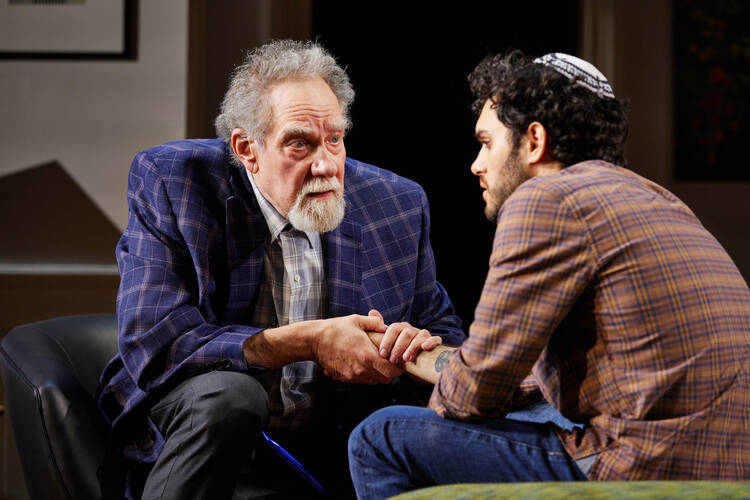For playwrights, family dramas are never just about families. From Aeschylus to Lorraine Hansberry, household dynamics are the template on which dramatists play new variations on old themes: economics, race, religion, sexuality, and the state and soul of the nation.
Two plays now on Broadway offer fine contemporary case studies of the form and its possibilities. “Appropriate” is an edgy epic by Branden Jacobs-Jenkins in which a white family convenes at their late father’s Arkansas home to sort through his things and their own unfinished business, only to be shocked and freshly torn by discoveries about both. Joshua Harmon’s “A Prayer for the French Republic” follows a few generations of a Jewish family in France as they reckon with a legacy of antisemitism at least as stubborn as their own survival in spite of it. Both plays interlace trauma and comedy, and at their best capture the unstable compound of comfort and pain at the heart of family life. They also suggest, with varying levels of success, the ways in which these tight, often toxic bonds represent larger social pathologies.
For playwrights, family dramas are never just about families.
The Lafayettes of “Appropriate” are damaged goods, almost to a person, starting with the eldest, Toni (Sarah Paulson). Recently divorced and comparatively most distraught about her father’s death, Toni attempts to take the reins of his estate and affairs, over the objections and interference of her brothers, Bo (Corey Stoll) and Franz (Michael Esper). When one of Bo’s kids stumbles upon a scrapbook of explicit historic photographs of Black people who have been lynched, possibly on the Lafayette property, the already fraught family dynamics spiral downward into levels of recrimination and implication older than the nation’s founding.
Jacobs-Jenkins, an accomplished dramatist making his overdue Broadway debut, is in complete control of his material here, almost to a fault. Not only does he not shrink from the full measure of absurd and harrowing consequences his narrative sets in motion; he often seems to linger over them with an impish glee that is both infectious and troubling. At times “Appropriate” feels like a pointedly self-conscious riff on the American family play, with trace elements of Eugene O’Neill, Sam Shepard and Tracy Letts.
Still, to the credit of both Jacobs-Jenkins and the director Lila Neugebauer, helming a powerhouse cast, what could easily play as brittle satire has undeniable emotional purchase. The characters’ contention over memory and responsibility never feels less than personal, even as it ripples out well beyond the walls of their father’s former plantation house—and even beyond the estate’s unmarked cemetery of enslaved people. This is America, in Jacobs-Jenkins’s telling: white folks fighting for scraps over graves.
This is America, in Branden Jacobs-Jenkins’s telling: white folks fighting for scraps over graves.
In its own way, Harmon’s “A Prayer for the French Republic” also speaks to the state of our nation, albeit through the lens of another’s unique history. The play shuttles between two Jewish households in Paris in two different periods: the Salomons, who survive World War II with their piano-selling business intact, despite catastrophic losses and indignities; and the Benhamous, the family into which a Salomon granddaughter, Marcelle (Betsy Aidem), has married. The latter household is visited by a distant American cousin, Molly (Molly Ranson), at a delicate moment, as 20-something son Daniel (Aria Shahghasemi) has been attacked on the street for wearing a kippa. Soon the family’s patriarch, Charles (Nael Nacer), decides it’s time to leave France for Israel, where at least he feels that he and his family can feel at home living openly as Jews. “I’m scared, Marcelle,” he says. “Something is happening in the world, and it’s happening in our country, too—I can feel it.”
At its best, “Prayer” gives dramatic voice to this sense of existential threat, which so many Jewish people in the United States and Europe have felt rising (again) in recent years, as antisemitism both virulent and casual has taken the form of bloody hate crimes and unsettling discourse on the right and left. Harmon, whose family traces its origins to France, seems equally compelled and confounded by that country’s mixed legacy regarding its Jewish populations.

The first European country to give Jews full citizenship, France was also the home of a relatively large percentage of Holocaust survivors, compared with other European countries. The nation’s history of secularism has undoubtedly allowed private Jewish practice to thrive, though this may not be quite the same kind of religious freedom we value in the United States. In a signal French irony, the country’s newly appointed prime minister, Gabriel Attal, has Jewish heritage but is most popular in France for his decision last year, as minister of education, to ban Muslim women from wearing abayas in school. “You must not be able to identify the religion of students by looking at them,” he said.
That is eerily close to the argument put forth by Marcelle’s brother, Patrick (Anthony Edwards), who believes that his family’s survival has depended on muting or outright abandoning their Jewish faith, as he has. This has been a resounding theme for Harmon, who in his early hit “Bad Jews” staged the assimilation-vs.-separation debate as a comic cage match. Also as in that play, he has a wild-haired, depressive harpy, in this case Elodie (Francis Benhamou, coincidentally named), make a strident case for embattled Jewish identity against the mild objections of polite liberal Molly (Ranson played a similar role in “Bad Jews,” in fact). Elodie is also the one who delivers the arguable talking point that the rise of Donald Trump imperils the idea of the U.S. as a beacon of tolerance.
Elodie is also the most aggressive voice in shouting down Molly’s weak attempts to criticize Israel and its occupation of Palestinian territories (“Prayer” is set in 2016-17, well before the current conflict in Israel and Gaza). Audiences who see antisemitism as the overriding issue of our moment may cheer Elodie on, but those of us aghast at the harrowing war on Gaza may feel more like Molly, who—in the midst of a tirade by Elodie comparing Israel’s actions to the atrocities of other nations, including the United States—can only muster a feeble, “Are you familiar with this thing called whataboutism?”
Unfortunately, “Prayer” is an ungainly and overlong play in which nuance fights righteous speechifying to a draw. Among its moments of clarity, though, is one in which Patrick acknowledges that there are other outcasts in the world besides Jews, and that one moral imperative imparted by the Jewish experience is to identify with and fight for the exile and the stranger. As his sister leaves for Israel against his objections, he tells us, “I’m rooting for her, and for all the wanderers of the Earth. There will be many more in the years to come, from all walks of life.” The family we’re part of, after all, is the human family.








